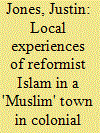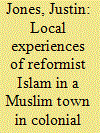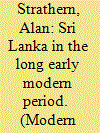|
|
|
Sort Order |
|
|
|
Items / Page
|
|
|
|
|
|
|
| Srl | Item |
| 1 |
ID:
089885


|
|
|
|
|
| Publication |
2009.
|
| Summary/Abstract |
In contemporary times, Hundi has collected countless labels; the international press has spurned innumerable villainous descriptions, the bulk of which have helped to perpetuate a dense fog of notoriety. The critical problem lies in definition. As there is an incomplete understanding of hundi's form and remit, there is also a rather limited understanding of why the system persists, set against the backdrop of modern banking. In many ways the problem of definition presented legal and financial authorities of the early and late twentieth century with core issues which remain unresolved and problematic for authorities in the twenty-first century. By drawing on archival and other historical material pertaining to the system's usage amongst Indian merchants, this paper attempts to tackle much of the confusion and many misconceptions surrounding hundi. The discussion explores the idea that hundi is more accurately described as an indigenous banking system endowed with a complex range of functions, but whose central purpose is trade.
|
|
|
|
|
|
|
|
|
|
|
|
|
|
|
|
| 2 |
ID:
090306


|
|
|
|
|
| Publication |
2009.
|
| Summary/Abstract |
In contemporary times, Hundi has collected countless labels; the international press has spurned innumerable villainous descriptions, the bulk of which have helped to perpetuate a dense fog of notoriety. The critical problem lies in definition. As there is an incomplete understanding of hundi's form and remit, there is also a rather limited understanding of why the system persists, set against the backdrop of modern banking. In many ways the problem of definition presented legal and financial authorities of the early and late twentieth century with core issues which remain unresolved and problematic for authorities in the twenty-first century. By drawing on archival and other historical material pertaining to the system's usage amongst Indian merchants, this paper attempts to tackle much of the confusion and many misconceptions surrounding hundi. The discussion explores the idea that hundi is more accurately described as an indigenous banking system endowed with a complex range of functions, but whose central purpose is trade.
|
|
|
|
|
|
|
|
|
|
|
|
|
|
|
|
| 3 |
ID:
089881


|
|
|
|
|
| Publication |
2009.
|
| Summary/Abstract |
This paper discusses shifts within Islamic life, ritual and practice in the town of Amroha in the United Provinces of India, during the eventful period of approximately 1860-1930. Based primarily upon Urdu writings produced about or by Muslim residents of the town during this period, it examines the ways in which wider religious reformist movements such as those associated with Aligarh, Deoband and Bareilly were received and experienced within nearby smaller, supposedly marginal urban settlements. The paper argues that broader currents of religious reform were not unquestioningly accepted in Amroha, but were often engaged in a constant process of dialogue and accommodation with local particularities. The first section introduces Amroha and its sharif Muslim population, focusing upon how the town's Islamic identity was defined and described. The second section examines a plethora of public religious rites and institutions emerging during this period, including madrasas and imambaras, discussing how these were used by eminent local families to reinforce distinctly local hierarchies and cultural particularities. A third section considers public debates in Amroha concerning the Aligarh movement, arguing that these debates enhanced local rivalries, especially those between Shia and Sunni Muslims. A final section interrogates the growing culture of religious disputation in the town, suggesting that such debate facilitated the negotiation of religious change in a transitory social environment
|
|
|
|
|
|
|
|
|
|
|
|
|
|
|
|
| 4 |
ID:
090304


|
|
|
|
|
| Publication |
2009.
|
| Summary/Abstract |
This paper discusses shifts within Islamic life, ritual and practice in the town of Amroha in the United Provinces of India, during the eventful period of approximately 1860-1930. Based primarily upon Urdu writings produced about or by Muslim residents of the town during this period, it examines the ways in which wider religious reformist movements such as those associated with Aligarh, Deoband and Bareilly were received and experienced within nearby smaller, supposedly marginal urban settlements. The paper argues that broader currents of religious reform were not unquestioningly accepted in Amroha, but were often engaged in a constant process of dialogue and accommodation with local particularities. The first section introduces Amroha and its sharif Muslim population, focusing upon how the town's Islamic identity was defined and described. The second section examines a plethora of public religious rites and institutions emerging during this period, including madrasas and imambaras, discussing how these were used by eminent local families to reinforce distinctly local hierarchies and cultural particularities. A third section considers public debates in Amroha concerning the Aligarh movement, arguing that these debates enhanced local rivalries, especially those between Shia and Sunni Muslims. A final section interrogates the growing culture of religious disputation in the town, suggesting that such debate facilitated the negotiation of religious change in a transitory social environment.
|
|
|
|
|
|
|
|
|
|
|
|
|
|
|
|
| 5 |
ID:
090307


|
|
|
|
|
| Publication |
2009.
|
| Summary/Abstract |
This essay examines the Indias' political leadership's romantic engagement with the idea of developmental planning in post-colonial India between 1947 and 1960. It looks at the experience of planning in India between 1947 and 1960. It explores some of the early ideas about developmental planning and the setting up of the Planning Commission in March 1950. Although there was widespread acceptance of the need for planning there was little consensus on the kind of planning that was required, or how it should be carried out. This essay examines attempts, which were made to institutionalise the planning idea. It looks at the heady ascent of the Planning Commission as the pre-eminent economic decision-making body in Independent India and the debates and contentions that took place in the early years of its formation. It argues that the 1956 foreign exchange crisis marked a climactic moment for planning. Thereafter, as far as economic decision-making was concerned, the locus of power shifted from the Planning Commission to other governmental agencies and the developmental planning process itself came to be over-shadowed by pragmatic economic management pursued by official agencies. Thus, in overall terms, developmental planning failed to establish strong institutional foundations in independent India and, in all this, the experience of the 1950s was formative.
|
|
|
|
|
|
|
|
|
|
|
|
|
|
|
|
| 6 |
ID:
089879


|
|
|
|
|
| Publication |
2009.
|
| Summary/Abstract |
This paper explores how Sri Lanka might fit into Victor Lieberman's theory of Eurasian history. Lieberman's work to date has focused on the 'protected rimlands' which he sees as sharing the same historical path from a milieu of warring little kingdoms to increasingly large, solid states. But what happens in a land, such as Sri Lanka, which can be considered 'protected' before 1500, and 'unprotected' thereafter? Political integration and boundaries are first discussed, followed by ethnic and historical awareness before 1500. The third section sketches the chronological development of Buddhism before 1500, while the fourth considers the impact of the European interruption, and the fifth briefly looks at the results for 1600-1800. Along the way, some problems with applying the notion of 'early modernity' to Sri Lanka are disclosed.
|
|
|
|
|
|
|
|
|
|
|
|
|
|
|
|
| 7 |
ID:
090302


|
|
|
|
|
| Publication |
2009.
|
| Summary/Abstract |
This paper explores how Sri Lanka might fit into Victor Lieberman's theory of Eurasian history. Lieberman's work to date has focused on the 'protected rimlands' which he sees as sharing the same historical path from a milieu of warring little kingdoms to increasingly large, solid states. But what happens in a land, such as Sri Lanka, which can be considered 'protected' before 1500, and 'unprotected' thereafter? Political integration and boundaries are first discussed, followed by ethnic and historical awareness before 1500. The third section sketches the chronological development of Buddhism before 1500, while the fourth considers the impact of the European interruption, and the fifth briefly looks at the results for 1600-1800. Along the way, some problems with applying the notion of 'early modernity' to Sri Lanka are disclosed.
|
|
|
|
|
|
|
|
|
|
|
|
|
|
|
|
| 8 |
ID:
090308


|
|
|
|
|
| Publication |
2009.
|
| Summary/Abstract |
Indian big business campaigned for economically nationalistic policies during the interwar period. Existing scholarship is sharply divided as to the reason for the same. One group of scholars claim that Indian big business as a class rose above its economic interests and actively joined and even led the anti-imperial nationalist movement during the period. The other group contests the above view and proposes that Indian big business was guided by business interests while rallying for economic nationalism. Significantly the interwar period is also marked by a growing antagonism between Indian big business and European commercial class apparently on racial lines, and they held diametrically opposite positions on most issues of commercial relevance. This development is cited as evidence in support of the former view. In this paper I present data of the European business collective of Kanpur, that exhibited almost identical positions as Indian big business, on several significant economic and political issues during the interwar period. From a detailed analysis of the nature of this collective (that had interests in cotton textiles, leather and sugar, amongst others) I have tried to re-configure the debate on the character of Indian big business during the interwar period.
|
|
|
|
|
|
|
|
|
|
|
|
|
|
|
|
|
|
|
|
|